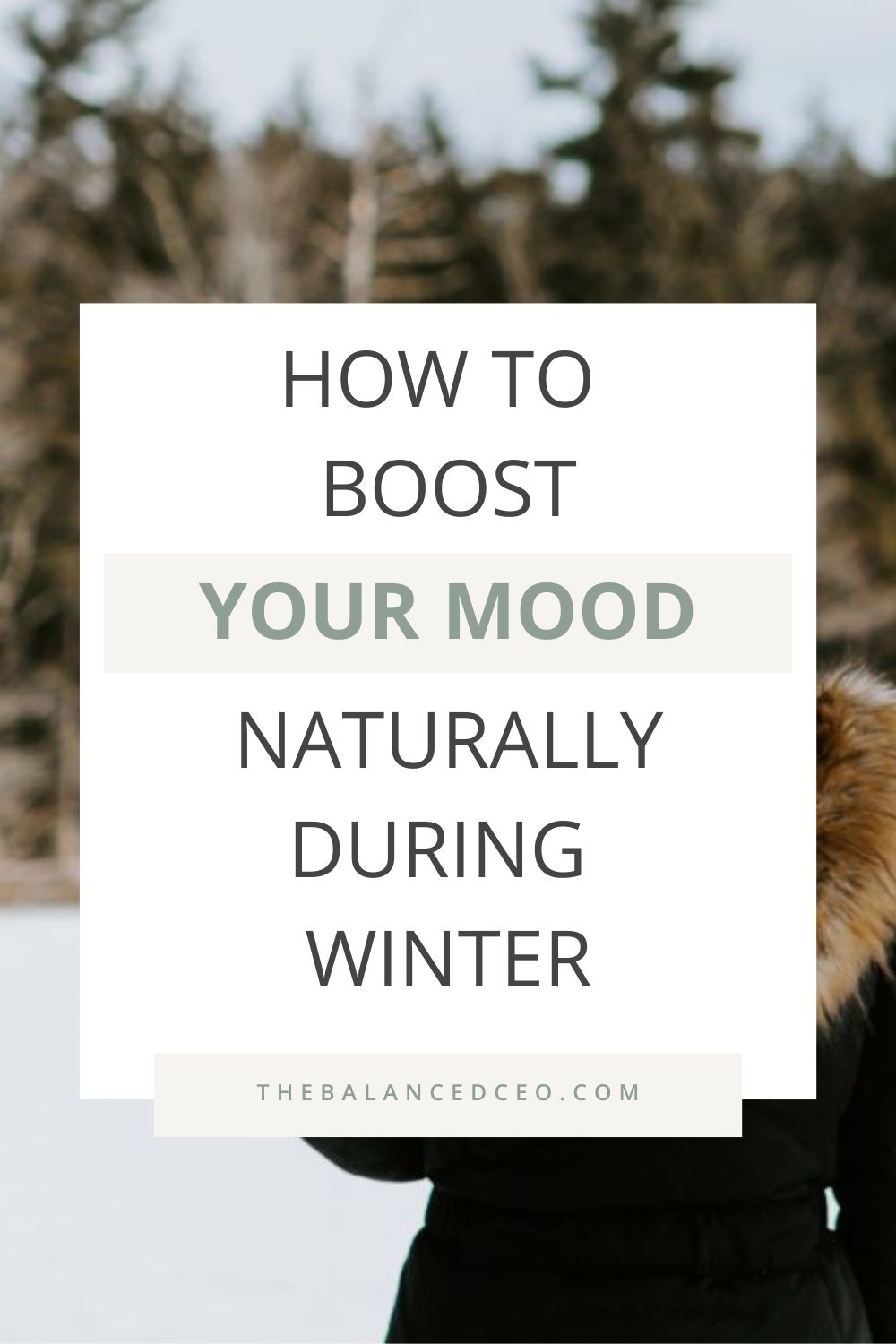This post may contain affiliate links, which means I’ll receive a commission if you purchase through my links, at no extra cost to you. Please read full disclosure for more information.

While some relish in the hectic frenzy of holiday parties, gift-giving, and creamy, delectable foods, others may want to run away. After some time, the excitement and joy of the winter season subside, and you may be looking forward to hibernating until spring.
Many people suffer from the “winter blues” — feeling sluggish, fatigued, and stressed amid darker days and cold, dreary weather. When this happens, it’s typical to crave comfort foods, avoid friends and family, and show a lack of interest in your favorite activities. Fortunately, there are different techniques you can try to help you boost your mood naturally during the winter.
What Is Seasonal Affective Disorder?
You should know you’re not alone in feeling out of sorts. Many people worldwide experience seasonal affective disorder (SAD) when the temperatures drop.
According to the National Library of Medicine, SAD affects up to 3% of the population and is 20% and 25% more prevalent in individuals with underlying depression and bipolar disorder, respectively.
SAD is best described as a temporary mood fluctuation as the weather changes, with symptoms lasting four to five months every year. People with SAD usually feel down due to less sunlight until the days are longer in the spring. Often, SAD can affect your thoughts and energy levels, too.
7 Strategies to Boost Your Mood During Winter
Experiencing SAD during the winter isn’t fun for anybody. Thankfully, these seven strategies can help you boost your mood naturally when the colder weather puts you in a slump.
1. Surround Yourself With Houseplants
People stay indoors nearly 80% to 90% of the time — in the winter especially, the cold limits their exposure to nature, which studies prove is beneficial to your mental health. Filling your home with houseplants is a solution to this problem. It also leaves you responsible for caring for and nurturing your plants to keep them alive.
A research analysis of 49 studies underscored an overall consensus on the biophilia hypothesis — or human-sought connections with nature. The review found exposure to plants has a medium-to-large positive effect on boosting one’s mood and eliminating negative emotions.
The best houseplants for winter require low light and little watering, such as a Chinese evergreen, amaryllis, or a ZZ plant. Creating a terrarium with moss and air plants is another option that doubles as an aesthetically-pleasing decorative piece in any room.
2. Go for a Walk
The last thing you might consider doing in the winter is going outside for leisure. However, bundling up for a brisk walk may be necessary to pull you out of the winter blues.
Even gentle exercise is beneficial for your mental health. According to one study, adults who walk for 2.5 hours weekly have a significantly higher chance of decreasing their risk of depression. Another study indicated spending 120 minutes outside in nature was associated with better mental and physical health outcomes.
It may be chilly during the winter, but you can still enjoy some time outdoors. Layer your body with warm clothes, put on your boots and gloves, and try getting outside for a walk to improve your mood.
Related Reads:
• Holistic Ways To Keep Your Mind And Body Healthy This Winter
• Mindful Winter Self-Care Ideas To Balance Your Life
• How To Ground Yourself In The Winter
3. Keep a Journal
Sometimes, writing down what you’re thinking or feeling provides a much-needed release. Therefore, journaling may be the right approach to boost your mood naturally during the winter.
Many therapists integrate journaling into their treatment plans, encouraging patients to write freely about whatever’s on their minds or follow a prompt. Some prompts for winter journaling could include:
- Your favorite winter memory.
- What you enjoy about the winter, such as sitting by the fireplace, wearing cozy socks, and drinking hot tea.
- Imagining you’re a snowflake and describe what you see as you fall from the sky.
- A review of a book you recently read.
- Describing a winter family tradition.
When you journal about the positive aspects of winter, you can rewire negative thoughts and renew your perspective on the season. Journaling is also excellent for practicing self-compassion with positive self-talk and may improve your confidence.
4. Eat Healthy and Exercise
One of the best ways to boost your mental health naturally is by eating right and exercising. A review of multiple studies suggested nutrition could support the prevention and treatment of mental health conditions in adults and children. One investigation, in particular, found improving your gut health may improve the efficacy of several mental health medications.
Food is nourishment for the body. Although you may be tempted to eat sweets and fattening meals when you feel low, a well-balanced diet of fruits, vegetables, whole grains, and lean protein is best.
Consuming foods high in omega-3 fatty acids is especially known for improving your mental health. For instance, salmon and nuts contain ample neurotransmissive and anti-inflammatory properties for optimal brain functioning.
Additionally, working out can reduce cortisol levels and increase the brain’s serotonin and dopamine production. Cortisol — also called the “stress hormone” — could contribute to your winter depression.
5. Get a Good Night’s Sleep
Many people either sleep long hours or experience bouts of insomnia when they feel sad. However, getting enough rest is crucial for your body to restore and rejuvenate itself. A lack of sleep may make you feel irritable and unable to concentrate, reduce your immunity and make you susceptible to getting sick.
Shutting down your devices and getting ready for bed earlier can induce a healthier sleep cycle. In return, you’ll feel more energized during the day and notice an improvement in your mood.
6. Practice Relaxation Techniques
Meditation and yoga practices have been around for centuries. Recently, research has proven their effectiveness in reducing stress and depressive episodes.
Study participants have reported mindfulness techniques have reduced their chronic pain and depression and can help treat mental health naturally. Meditation may also allow your body to relax enough to limit sleep disturbances.
Consider setting up a space to meditate or practice breathing exercises throughout the winter. Avoid bringing electronic devices into your sacred space and ensure you strictly reserve the nook for relaxation. Pillows, candles and incense are excellent ways to enhance your meditation experience.
7. Spend Time With Friends
Isolating yourself is expected when you’re in a slump — yet, spending time with loved ones can increase your mood and get you to participate in activities you enjoy again. Social interactions provide a sense of support and belonging, eliminating feelings of loneliness. There are also plenty of stress-free activities you can plan with others.
Ask a friend or family member to dine with you or invite someone to your home for a cozy movie night. You could also ask a co-worker to grab a drink after work or sign up for a wine and paint night.
Wintertime Self-Care Can Improve Your Mental Health
Practicing self-care is essential year-round. For those who struggle with winter, it could be the key to protecting their mental health the whole season. Switching up your routine to boost your mood naturally during winter with plants and healthy habits can make the long winter months fly by.

Cora Gold
contributor
Cora Gold is the Editor-in-Chief of Revivalist magazine, a publication dedicated to happy, healthy, and mindful living.





Leave a Reply